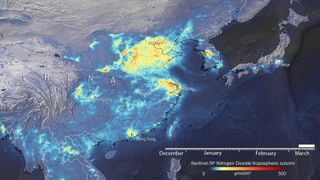Dropped emissions during COVID-19 lockdown will do 'nothing' for climate change
Unless the world gets serious about reducing fossil fuels.

While greenhouse gas emissions plummeted as the world locked down in response to the coronavirus pandemic, such dips will do "nothing" to slow climate change unless society moves away from fossil fuels, researchers have found.
On March 11, 2020, the World Health Organization declared the novel coronavirus disease, COVID-19, a pandemic, which it remains today. To slow the spread of the virus, countries around the world began implementing lockdown measures that limited travel and closed down factories and businesses. In turn, Earth-orbiting satellites saw a dramatic decrease in greenhouse gas emissions.
However, according to an international study led by the University of Leeds, unless large-scale, structural interventions — like a significant switch away from fossil fuels — are implemented, these changes will not affect Earth's climate. In fact, the researchers found, even if lockdown measures continue in some fashion around the world until the end of 2021, more than a year and half total, global temperatures will only be roughly 0.018 degrees Fahrenheit (0.01 degrees Celsius) lower than expected by 2030.
Related: New climate study shows that we need to be patient
More: Shutdowns from coronavirus create blue skies in California
"Lockdown showed that we can change and change fast, but it also showed the limits of behavior change," Piers Forster, study co-author and director of the Priestley International Center for Climate at Britain's University of Leeds, told AFP.
"Without underlying structural change we won't make it," he said, referring to climate goals.
Get the Space.com Newsletter
Breaking space news, the latest updates on rocket launches, skywatching events and more!
Climate work to do
Scientists have identified a temperature rise to "well below" 3.6 degrees F (2 degrees C) above levels before the Industrial Revolution as a major climate target. Some countries are striving to keep temperature rise smaller, below 2.7 degrees F (1.5 degrees C). However, according to these researchers, this goal will be difficult to reach.
"If I'm brutally honest, the world is unlikely to decarbonize at the rates required for 1.5 C, but getting anywhere close will make our children's future better," Forster said.
To see exactly how lockdown has affected emissions and climate in the long term, the researchers used open-source data to calculate exactly how the emission levels of 10 different greenhouse gases and air pollutants changed between February and June 2020 in over 120 countries. During those four months, the scientists found that production of pollutants including carbon dioxide and nitrogen oxides dropped by between 10% and 30%, a significant decrease.
However, the researchers found that the temporary emissions drop alone wouldn't have a significant impact on climate because these lockdown efforts are temporary, as opposed to larger, long-term structural changes.
"The fall in emissions we experienced during COVID-19 is temporary and therefore it will do nothing to slow down climate change," co-author Corinne Le Quere from the University of East Anglia said in the same statement.
In addition to measuring the effects of this temporary lockdown, the researchers also modeled how climate would be impacted if, after this lockdown period, larger changes like reduced use of fossil fuels were implemented around the world. The team highlighted that significant, government-led changes to reduce fossil fuel use would have a lasting, positive effect on climate.
The scientists found that if invested 1.2% of gross domestic product in low-carbon technology post-lockdown, they could cut their emissions in half by 2030 compared with if countries continued to rely on fossil fuels as they do post-lockdown.
"The government responses could be a turning point if they focus on a green recovery, helping to avoid severe impacts from climate change," Le Quere said.
This work was published Aug. 6 in the journal Nature Climate Change.
Email Chelsea Gohd at cgohd@space.com or follow her on Twitter @chelsea_gohd. Follow us on Twitter @Spacedotcom and on Facebook.
Join our Space Forums to keep talking space on the latest missions, night sky and more! And if you have a news tip, correction or comment, let us know at: community@space.com.

Chelsea “Foxanne” Gohd joined Space.com in 2018 and is now a Senior Writer, writing about everything from climate change to planetary science and human spaceflight in both articles and on-camera in videos. With a degree in Public Health and biological sciences, Chelsea has written and worked for institutions including the American Museum of Natural History, Scientific American, Discover Magazine Blog, Astronomy Magazine and Live Science. When not writing, editing or filming something space-y, Chelsea "Foxanne" Gohd is writing music and performing as Foxanne, even launching a song to space in 2021 with Inspiration4. You can follow her on Twitter @chelsea_gohd and @foxannemusic.
-
RRG The more it change the more it stays the same. The constant in life is change. The Petrified Forest in Arizona used to be Lush and green. I used to be Young. Tomatoes used to be seeds. The sun and water vapor you can't fool me. Huge factors. People have agendas whether they're scientist or not. Engineering climate? Even a dummy like me knows better.Reply
